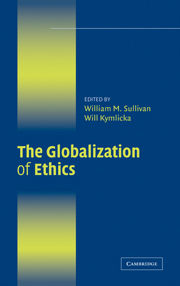Book contents
- Frontmatter
- Contents
- Contributors
- Acknowledgments
- 1 Introduction: The Globalization of Ethics
- 2 Global Ethics and the International Law Tradition
- 3 Morality and Universality in Jewish Thought
- 4 Globalization and Christian Ethics
- 5 Buddhism and the Globalization of Ethics
- 6 Muslim Perspectives on Global Ethics
- 7 Confucianism: Ethical Uniformity and Diversity
- 8 Natural Law, Common Morality, and Particularity
- 9 Liberalism and the Globalization of Ethics
- 10 Feminist Perspectives on a Planetary Ethic
- 11 Ethical Universalism and Particularism: A Comparison of Outlooks
- Appendix: Key Documents on Global Ethics
- Bibliography
- Index
4 - Globalization and Christian Ethics
Published online by Cambridge University Press: 03 September 2009
- Frontmatter
- Contents
- Contributors
- Acknowledgments
- 1 Introduction: The Globalization of Ethics
- 2 Global Ethics and the International Law Tradition
- 3 Morality and Universality in Jewish Thought
- 4 Globalization and Christian Ethics
- 5 Buddhism and the Globalization of Ethics
- 6 Muslim Perspectives on Global Ethics
- 7 Confucianism: Ethical Uniformity and Diversity
- 8 Natural Law, Common Morality, and Particularity
- 9 Liberalism and the Globalization of Ethics
- 10 Feminist Perspectives on a Planetary Ethic
- 11 Ethical Universalism and Particularism: A Comparison of Outlooks
- Appendix: Key Documents on Global Ethics
- Bibliography
- Index
Summary
There is no single attitude or program, statement, or orientation that articulates a Christian approach to the globalization of ethics, or, for that matter, to global trends in society, economics, culture, technology, law, or politics, which are often the carriers of religiously rooted ethical principles and ends. That is in part because there are competing definitions of what globalization is, its sources, range, and effects, and in part because there are several alternative understandings of what the most important features of Christian ethics are. Neither the biblical resources nor the classical traditions present Christians with a monolithic perspective. Although there is one Christ, he is portrayed in the Gospels by many authors, and although there is one God, that unity is held to be constituted by a trinitarian set of “persons” in interactive relationship.
In ethics as well as in theology, which is always a companion to ethics in the Christian tradition, several key modes of normative discourse have been joined in various ways in various parts of the tradition. Thus, in order to focus the discussion, so that it does not sprawl in all directions, I shall proceed in four steps. First, I will describe what I take to be the major modes of Christian moral discourse needed to address this question of the globalization of ethics. Second, after setting out these modes of moral discourse, and emphasizing how they necessarily interrelate in all actual Christian moral judgments, I will use this approach to evaluate the relative merits of two major, antithetical, understandings of globalization in debate among Christians today.
- Type
- Chapter
- Information
- The Globalization of EthicsReligious and Secular Perspectives, pp. 53 - 74Publisher: Cambridge University PressPrint publication year: 2007



